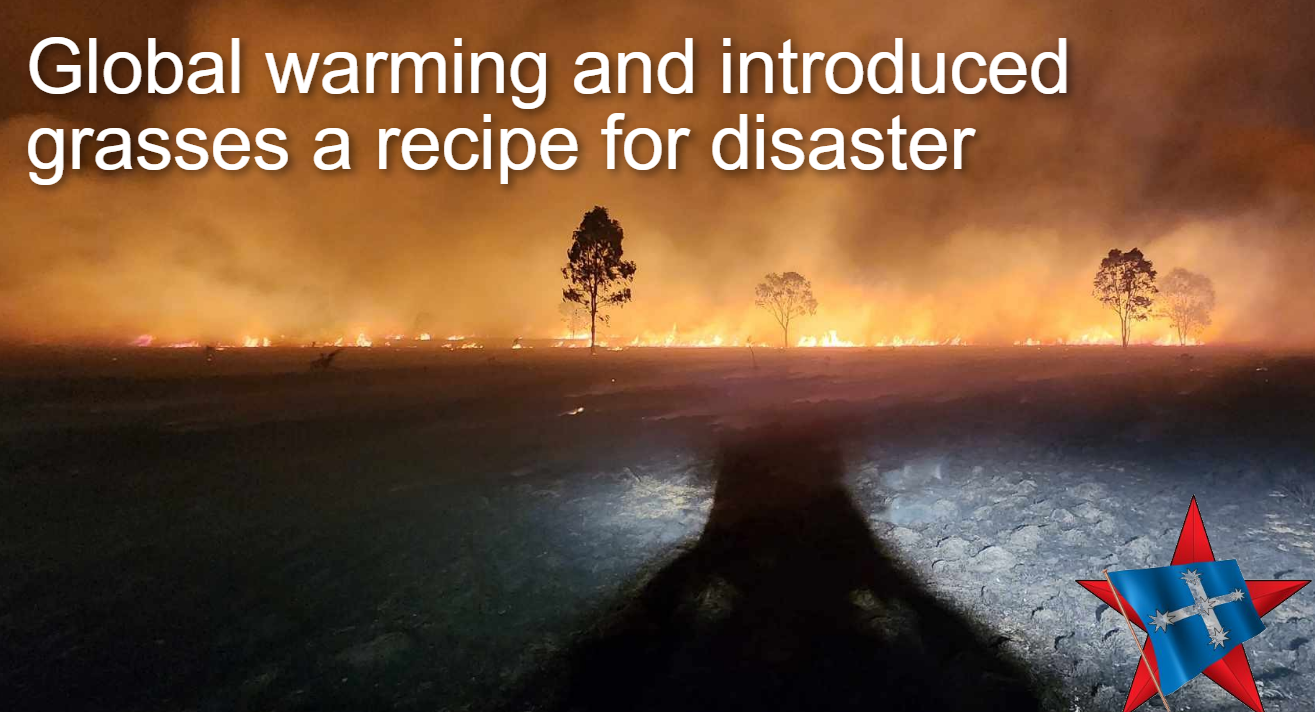For a United Front against Fossil Fuels and Feral Species
Written by: Alan Jackson on 3 November 2023
(Above: Original image Queensland Fire and Emergency Services facebook)
This week, dozens of fires have burned across Queensland. More homes have burned in the state than during the 2019–2020 Black Summer – 57 so far this year, compared to 49.
The current fires are peculiar compared to previously because the fires aren’t being slowed in any capacity by nighttime which usually brings lower temperatures and more moisture in the air. Queensland South-East and western downs regions are seeing more than five times more nighttime hotspots than average. (1) This is not an isolated issue and corresponds to similar cases in Canada, Spain, Greece and many other countries. Strongly permeated by ongoing climate change due to capitalism’s inherent infinite expansion of a finite planet and gutting of safer more pricey alternatives for cheaper and dangerous alternatives that destroy the environment.
Adding petroleum so to speak to this already heated situations is a key ingredient in Hawaii’s deadly Maui fires — unmanaged invasive grasses, like the highly inflammable buffel grass — is also spreading throughout vast areas of Australia, prompting a warning about the increased risk to people, houses and biodiversity on this side of the globe.
Buffel grass expansion is growing further south at an accelerated rate and has the ability to grow in 60-70% of Australia, particularly in dry and arid climates which are so very common place in Australia. Buffel grass is also tough to manage with the labour required being intensive and expensive due to buffel grass’s widespread distribution often in remote areas. (2) Almost 50% of the Tjoritija/MacDonnell national park west of Alice Springs has been burnt since the start of 2023 with Northern Territory Parks and Wildlife senior director Chris Day stating “if we only had native grass in the landscape we would find these fires much less intensive”. (3) To date, an area twice the size of Tasmania has been burnt in the NT.
Not only is the damage from the expansion of buffel grass ecological due to the fires it permeates but it is also cultural effecting Fist Nations people directly through its destruction of native plant biodiversity that is so important to their daily lives.
Buffel grass is one of the worst invaders of arid ecosystems worldwide. Across Central Australia, buffel grass was deliberately planted at scale since the 1950's by the NT Government, CSIRO and pastoralists as a feed for cattle and as a dust suppressant for degraded lands (usually due to overstocking). Buffel grass outcompetes native wildlife and is considered a transformer weed due to its ability to change habitat and is greatly impacting First People’s culture and connection to country. For many years Aboriginal leaders from affected areas have been speaking out and demanding action to mitigate the buffel grass threat. Buffel is still not considered a weed in the Northern Territory despite it being declared so in South Australia in 2015. Buffel affects the viability of bush foods, bush medicines and plant materials to be harvested, in addition to altering hunting practices. Culturally significant animal and plant species are to also be impacted. (4)
The reason that Buffel grass and climate change have been allowed to gut Australia’s climate and habitat is due to monopoly capitalism and its failure to shut down fossil fuel industries allowing global warming to permeate. Inherently connected to capitalism’s insatiable drive for profit is the pastoral industry’s profit-before-environment over-grazing and denuding of country, followed by introduction of invasive species like cane toads, and grasses such as buffel grass and the failure of the governments and pastoralists to manage crops that aren’t native to our country.
These fires and the ecological destruction of the country cannot be stopped unless capitalism is dismantled. A system predicated on infinite expansion of a finite planet cannot fix our ecological disasters and societal ills. Socialism is a necessity. In the meantime, a United front of the First Nations people, small and medium-sized farmers, regional townsfolk and the urban working classes must be agitated, organised, mobilised and unleashed in mass united struggle against buffel grass, global warming and unhealthy environmental practices that continue to destroy Australia’s environment and First Nations peoples’ daily life necessities.
I write this on the traditional land of the Butchulla people and recognise the abhorrent appropriation that led to my fortunate dwelling here.
Print Version - new window Email article
-----
Go back
Independence from Imperialism
People's Rights & Liberties
Community and Environment
Marxism Today
International
Articles
| Capitalism fails the aged care test |
| More Invasion Day reports |
| Invasion Day in Sydney: ‘We are stronger than their lies, Stronger than their prisons’ |
| The politics of “non-political” appointments |
| On January 26 we celebrate resistance, mourn losses and speak truth. |
| New Federal environmental laws insufficient for forests’ survival |
| Net Zero targets – Peoples struggle against Green and Brown Capitalists |
| WA rally for Queer and Trans rights |
| Return WA's freight rail to the workers |
| Why did heroes succeed after police leadership and ASIO fail at Bondi? |
| 8000 Rising Tide protesters enforce Newcastle Port shutdown |
| Modern slavery contributes to Supercars championship profits |
| People's struggle continues against SA government " love affair" with property developers and their $1 per year rent! |
| Book Review: The New Age of Sexism |
| Tuvalu: global warming forces diplomatic reappraisal |
| The uphill struggle to protect NSW’s Koalas |
| We have strength to stop Israel’s participation in cycling’s Tour Down Under |
| We welcome the call for a climate-based and more independent foreign policy. |
| Sovereign Citizens: A few inconvenient home-truths for the centre-right |
| That old divide and conquer songbook |
-----

